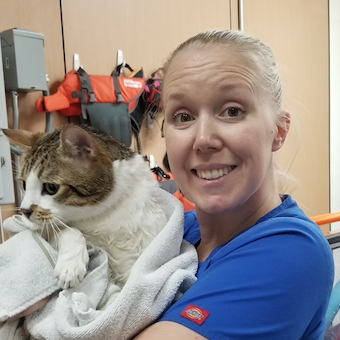Vet med is hurting. Turnover, churn, and self-harm rates in the industry have never been higher and a lot of the problems that cause this are more systemic than anything — insufficient pay and high debt to income ratios, increasing pressure and demand from pet owners, and a lack of recognition.
So, as management, what can we do to make our veterinary teams healthier and happier? The answer lies in psychological safety.
Psychological safety means being able to be your whole self without fear of negative consequences. This may be as simple as owning a small mistake they made or as serious as someone proudly living in their gender or racial identity.
To give some insight into this sometimes complex and nuanced topic, we teamed up with Josh Vaisman, CCFP, MAPPCP. Josh is Co-Founder & Lead Consultant at Flourish Veterinary Consulting. With 10+ years of practice management experience, Josh now dedicates his time to helping veterinary practices flourish...see what we did there?
Why is psychological safety so important?
Imagine this scenario: I buy a packet of the very best tomato seeds money can get. 🍅
I plant the seeds in my Colorado garden in the middle of December. ❄️
Weeks later, when the frozen, dry dirt has failed to produce a vibrant tomato plant, I blame the seeds.
Psychological safety in veterinary teams is the fertile soil in which resilience, innovation, efficiency, and professional fulfillment grow.
If we want veterinary teams that learn together, grow together, achieve together, and stay together we must cultivate psychological safety in the environments in which they work.
What does psychological safety look like in practice?
A psychologically safe team will frequently take interpersonal risks in service to the higher purpose of the work.
To support growth in themselves and each other, they'll openly share and discuss shortcomings, stumbles, failures, and mistakes.
To improve the system in which they work toward their shared purpose, they will productively challenge themselves and each other as they seek creative and innovative ways to practice better medicine, client service, and teamwork.
Blaming is replaced with seeking. Jockeying for visibility and status is replaced with curiosity and support. Challenging conversations are frequently had with kindness and a desire to strive toward the best version of who they can be as individuals, a team, and an entire hospital.
So, how can vet teams create psychological safety?
By modeling the behaviors we seek. This must begin with those in leadership. Those with the most authority hold the most influence. Leaders must take tangible, intentional, routine, and consistent action to show that their team environment is a safe place for the uncomfortable journey of learning and growth.
1. Don’t be afraid of receiving feedback
Start by finding routine opportunities to ask for constructive feedback:
"When I did ______, what could I have done better?"
Then, listen and show curiosity. While you may not agree with the feedback, hear it and respond in a way that will encourage this person to continue opening up to you.
This can also be more formal. One example is sending out a regular survey with simple questions like: “What could management do better to support you?”
2. Don’t be afraid to also give direct feedback
Avoidable mistakes are only avoidable when we can both see and discuss them. The seeing is already there — it's up to us to cultivate workplaces that make the discussion safe. Only in safety can this kind of learning become the expectation.
When giving feedback, be focused, timely, and direct. We’ve all had a manager who gave vague feedback during a team huddle as opposed to directly addressing an individual privately in a safe environment. And, it didn’t feel good.
Be the manager you wish you had when you were coming up in your career. It takes courage to give direct feedback, and it goes a long way with your team when you do.
Want a more in-depth look into how to give and receive feedback? Check out our section on this in the Ultimate Guide for Awesome Culture in Veterinary Medicine.
3. Encourage your team to grow 🌱
Everyone (and I do mean everyone) who works in vet med genuinely hopes to make a positive impact on the clients, patients, and communities they serve. They are also working in a highly charged environment surrounded by passionate, talented teammates.
Combined with the natural perfectionism deep in the veterinary psyche? We begin to tie our worth to our performance.
Failure is too painful a concept to imagine, much less experience.
It is unreasonable to expect people to enter such a culture and have enough courage to openly and candidly share. The result is a very natural culture of withholding.
"Well, that wasn't that big a mistake, so I'll just wait and see…”
“I mean, they’re doing basically good enough so I won't say anything…”
“What will they think of me if I admit to this? Better keep it to myself."
Most of the time these little daily withholdings don't bring major problems. Most of the time, things work out "just fine." Emphasis on most.
Sometimes, though, the opportunity to be better, do better, accomplish more in a way that brings meaning and fulfillment just requires feeling safe enough to speak up.
This can come in the form of continuing education, upskilling, mentorship, or sponsorship.
Want a more in-depth look into how to help your staff grow? Check out our section on this in the Ultimate Guide for Awesome Culture in Veterinary Medicine.
Start creating happier, healthier teams.
Instilling your team with confidence and helping them feel safe speaking up benefits everyone. It helps current productivity and also helps retention and recruitment efforts.
Want a sidekick in hiring and recruiting? Scout is a new approach to recruiting and hiring veterinary teams. Check out more here.





.gif)

